As cancer progresses, systemic symptoms such as weight loss and anorexia worsen. This condition, called "cancer cachexia", occurs in many patients in the advanced stages of cancer. While the character for "liquid" appears in the spelling of the Japanese translation, this may give the impression that some kind of liquid substance occurs in the body, but that is not the case. Cancer cachexia is the general term for the syndrome that appears as cancer progresses.
Research on how cancer cachexia adversely affects cancer prognosis was previously limited. This is because complex disorders with various physiological abnormalities are involved and because analytical methods have not yet been established. From this background, in an experimental model using Drosophila, a research group at the Institute of Physical and Chemical Research (RIKEN) identified a class of protein, "netrins", which are produced by cancer cells and is involved in cancer cachexia.
The protein acts on body tissues distant from cancer cells to exacerbate systemic symptoms. Results of this research will contribute to the treatment of worsening systemic symptoms in patients with advanced cancer, to improve their survival rates and QOL.
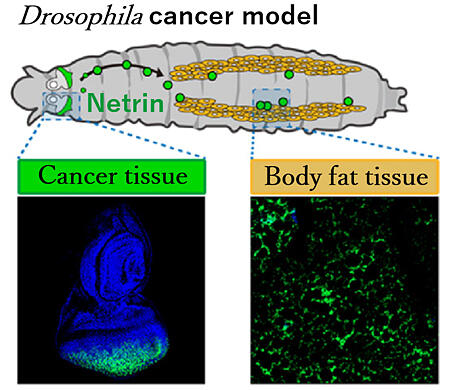
(provided by RIKEN)
Although described in ancient medical texts, clarification was delayed
Various studies are being undertaken to determine the mechanism of cancer development. The development of new methods to prevent cell cancerization and to remove cancerous cells and cancer tissues is also underway. Advances in medical care have improved 5- and 10-year survival rates. However, the treatment results for some cancers such as pancreatic and advanced stage cancers remain poor.
Systemic symptoms such as loss of muscle and fat, which are characteristics of cancer cachexia, are observed in over 80% of patients with advanced cancer and adversely affect prognosis. According to the RIKEN research group, cachexia is also described in ancient Greek medical texts. The medical term "cachexia" is said to have been translated in the Meiji period and is still used today.
Because cachexia is also found in diseases other than cancer, it is called "cancer cachexia" when it is associated with the advanced stages of cancer. Weight loss and anorexia due to the loss of skeletal muscle and body fat are typical symptoms and may be also accompanied by "mental weakness" such as depression and anxiety.
Cancer cachexia is a troublesome entity that plagues not only the patient but also the treating physician. However, due to the difficulty of research and analysis in these patients, investigations to elucidate the mechanism of this syndrome, which is related to life and death, have lagged. The cancer cells themselves do not cause these adverse effects.
The cancer cells themselves do not cause these adverse effects
The research group led by Postdoctoral Researcher Morihiro Okada and Team Leader Sa-Kan Yoo (both from the RIKEN Center for Biosystems Dynamics Research (BDR)) selected Drosophila as an experimental model because it is suitable for analyzing complex physiological abnormalities at the individual level.
They focused on "Ras", an oncogene that is mutated in various human cancers, and constructed an experimental model of cancer by expressing the mutant Ras gene in tissue that will become the future eye of Drosophila larvae. More than 80% of the flies died within a few days, although the cancer cells that arose in the eyes of the adult flies did not metastasize or proliferate.
Based on this observation, the research group hypothesized that "it is not the cancer cells themselves that adversely affect the whole body, but the substances that they secrete." Their detailed analysis revealed 20 types of substance candidates with adverse effects. Subsequent experiments to inhibit the gene expression of all these substances showed that the suppression of netrin in cancer cells significantly increased the survival rate of individuals.
Netrin is a substance involved in the formation of neural circuits. The research group then visualized netrin with fluorescent proteins and confirmed that it is equivalent to the body fat tissues, corresponding to the liver and fat tissues of mammals, is essential in maintaining the metabolism of fat tissue in Drosophila, and suppresses the production of the substance "carnitine".

(provided by RIKEN)
Lack of energy leads to debilitation and death
Carnitine is essential for converting intracellular fatty acids into energy. A series of experiments and analytical results by the research team revealed that netrin lowers carnitine levels to cause energy deficiency, debilitation, and death.
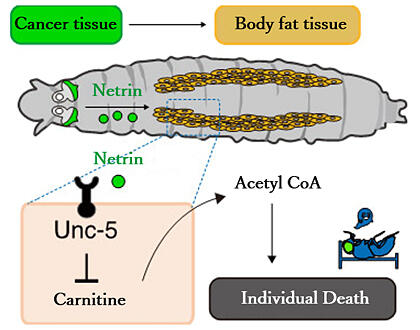
(provided by RIKEN)
Suppressing the action of netrin did not affect the cancer cells themselves but rather increased the carnitine levels to significantly improve the survival rate. Moreover, the survival rate was also restored by supplementing deficiencies in carnitine and acetyl CoA produced by the carnitine in cancerous fruit flies.
In patients with cancer, as the cancer progresses, the amount of netrin in blood and urine increases, while the amount of blood carnitine decreases. The involvement of netrins and carnitines seems likely to apply to humans.
Even if the cancer cells themselves are not eliminated, they alter the metabolic state of tissues away from the cancer cells. Therefore, individual deaths may be avoided by metabolic changes.
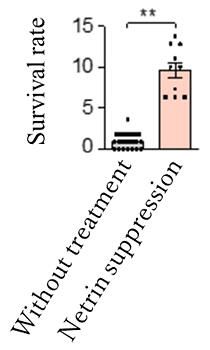
(provided by RIKEN)
The survival rate for advanced cancer is significantly low
On March 15, the National Cancer Center (NCC) announced the 5-year survival rate of patients diagnosed with cancer in 2014−2015 at national cancer hospitals. The updated survival rate (relative survival rate) was 66.2%. Compared to the past survival rates, the numbers are improving slightly, and the increase is steady.
Data from a total of 940,000 in-hospital patients with cancer collected from 447 facilities, showed no major trend changes in cancer; however, the breakdown is high at 95.1% for prostate cancer in men and 91.6% for breast cancer in women, and low at 11.5% for small cell lung cancer and 12.7% for pancreatic cancer.
Detailed examination of the progression in prostate cancer with high 5-year survival rates of 100% for stages I and II, which dropped to 60.1% for stage IV. Similarly, in breast cancer, the survival rates for stages I and II are in the 90% range but fall to 39.8% for stage IV. Advanced stage cancer is an example showing a remarkably low survival rate.
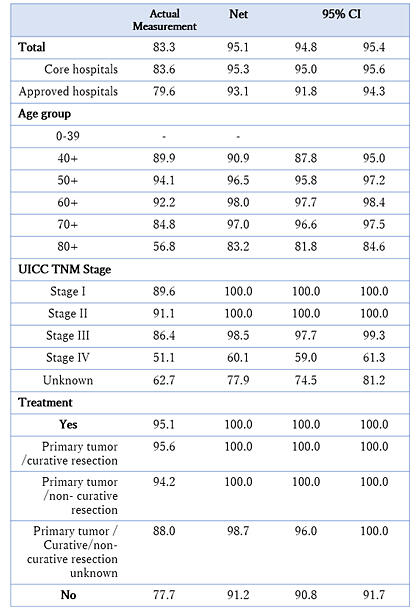
(provided by the National Cancer Center, Cancer Control Institute, Cancer Registry Center)
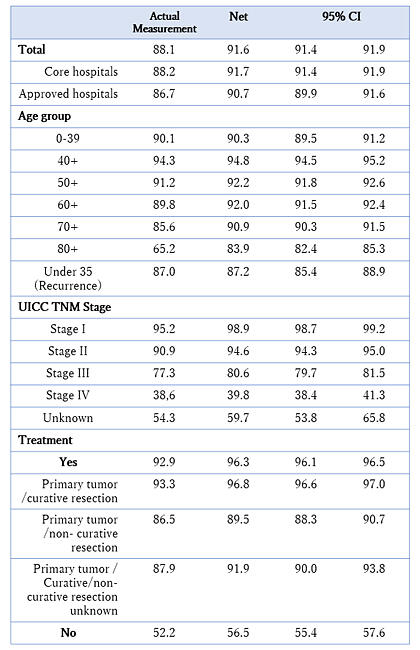
(provided by the National Cancer Center, Cancer Control Institute, Cancer Registry Center)
The degree of cancer progression varies among sites. For example, prostate cancer progresses slowly, with low patient ratios for stages III and IV (each about 15%), which increases the overall survival rate. In contrast, in small-cell lung cancer, the cells proliferate at a high rate and the disease progresses rapidly. Pancreatic cancer has few symptoms in the early stages and is often already in the advanced stages when discovered.
Improvement of systemic symptoms is of great medical significance
Unfortunately, the survival rate of patients with advanced stage cancer is low. Complex factors appear to be involved in cancer cachexia, which has a major impact on the prognosis of patients with advanced cancer. Loss of appetite decreases body strength. Chemotherapy involving the administration of anticancer drugs and radiation therapy involving the exposure of cancer cells to radiation require a certain level of body strength.
According to oncologists, many people tend to die without accepting these treatments because their debilitated bodies cannot tolerate newly developed drugs or effective radiotherapy. Countermeasure against cancer cachexia is a major issue in cancer medicine.
Some research results showed that low molecular weight proteins "cytokines" produced by cancer cells act on the brain to reduce appetite. An appetite-stimulating drug, "Anamorelin", was approved in January 2021 and is now being used. Through this, research on the elusive nuisance of cancer cachexia progresses gradually.
The clarification of the involvement of netrin and carnitine by this group may lead to future therapeutic drugs. In other words, these findings may lead to life extension even if cancer cannot be eradicated. Even if cancer progresses, improved systemic symptoms will increase survival rates. These findings are of great significance to cancer treatment.
(UCHIJO Yoshitaka / Science Journalist)
Original article was provided by the Science Portal and has been translated by Science Japan.




